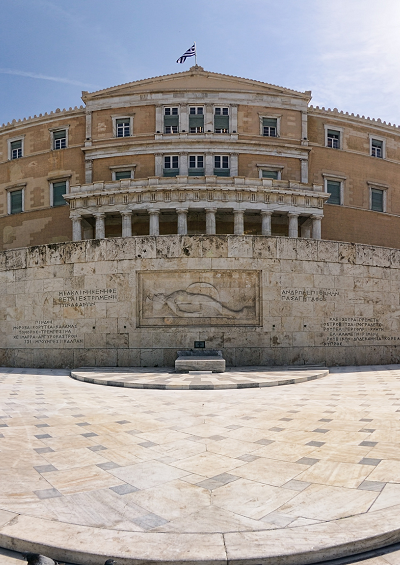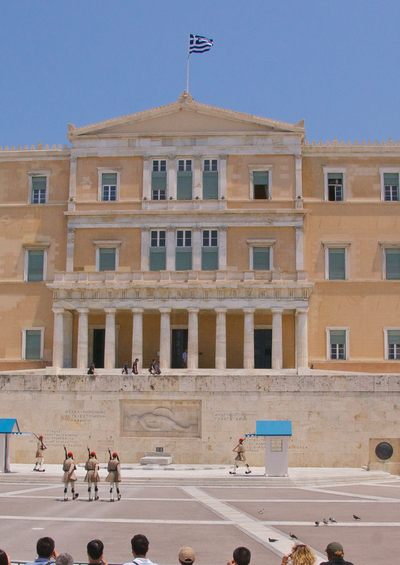Notes From Athens: The Syriza Policy Illusions
The debate in Greece is too caught up on four major delusions.
January 29, 2015

Just back from Athens, I feel almost compelled to shout it from the rooftops: It’s not about the debt. It’s the economy, stupid (to borrow a phrase from James Carville)!
In Athens, many of the discussions revolve around the debt: How much will Europe cut the burden now that Greek voters have asked for it? Or: Wouldn’t it be cheaper for Europe to write off half its claims on Greece than to risk losing it all?
The four delusions
The new Greek government and its voters are in for a reality shock. The debate in Athens seems to suffer from four delusions.
Delusion 1: It’s about the debt, not the economy
Now at 175% of GDP, Greek public debt is very high. But Europe and the IMF have already seen to it that the debt is bearable with low interest rates, long maturities and generous grace periods.
The European promise remains: If Greece stays the course of supply-side reforms, the debt service will not suffocate Greece. In return for reforms, Europe can and will offer even lower interest rates and longer maturities. Asking for a cut in the nominal debt is pointless.
For the sake of argument, assume that the creditors were to write off half the Greek debt and return Greece to full capital market funding thereafter.
On its remaining debt of 88% of GDP, a post-default Greece not eligible for ECB purchases and pursuing Syriza-style policies might soon have to pay more interest than the 4% of GDP Greece actually paid on its debt in 2014. Bad deal.
The massive Greek debt is mostly the result of deep-rooted structural problems such as an overstaffed and inefficient public sector, an overregulated private sector and an inflexible labor market.
If Greece is a bad place to invest and create jobs and if its bureaucracy and tax system scare away businesses, Greece cannot get the sustained growth and tax revenues it needs.
If Syriza indeed reverses many of the useful, if incomplete labor market and public sector reforms of the Samaras government and stops privatizations, it is difficult to see how creditors could ever agree to lend more money to a borrower who is destroying its potential to grow and service its debt.
A large-scale reversal of pro-growth reforms is a much bigger breach of Greece’s obligations to its creditors than a modest fiscal overshoot. It’s about creating a competitive economy for the long run, not about the debt or a fiscal number for one year.
Delusion 2: It’s all about Greece
Greece matters. Europe would love to keep Greece in the euro and on the path to growth. Europe is happy to fund the process, but only if Greece keeps laying the foundations for sustained growth. Tough love means that help is conditional.
Remember the bigger European reform picture: In the early 1980s, Thatcher reformed the labor market and other sclerotic institutions in Britain. In the early 1990s, Scandinavian countries overhauled their welfare systems. From 2003-2005, Germany cured its structural malaise through labor market and welfare reforms. It was tough and unpopular at the time, but it worked.
The grand European project now is to keep Spain, Portugal and Greece on the reform track, while nudging big Italy and France to follow suit. This is how Europe as a whole can become as competitive in a globalized world as Sweden, Switzerland, Germany and Slovakia already are today, to name just a few.
Seen from Brussels and Frankfurt, from Berlin, The Hague and Tallinn, this is about Madrid, Rome and Paris, much more than about Athens.
Funding lunacies — such as reregulating the Greek labor market, creating a bad precedent and rewarding a populist who reneges on his country’s obligations and makes it less rather than more competitive — is not part of the plan.
That the German ultra-left (Die Linke) is applauding Syriza’s every move is as telling as it gets: After all, they are the legal successors to the Communist party that had built the wall and driven East Germany into the ground until it collapsed. Not a good company to keep.
Delusion 3: Ignore the IMF, outvote Berlin, send the troika packing
Greece would like to “negotiate” with Europe about the debt, seeking allies to outvote the pesky creditor countries. Well, try to “outvote” your bank next time you ask for a new loan while threatening to default on your old mortgage. Good luck.
Europe has time and money, a Greece mired in uncertainty has little of either. Nothing can happen, not even a simple extension of the end-February deadline for the pending troika review of Greek progress, unless the parliaments of creditor countries agree. Reform reversals and schmoozing up with other populists such as Spain’s Podemos won’t exactly help.
The IMF has its serious flaws. It did insist far too much on short-term austerity rather than long-term structural reforms initially. But that is history. It is hard to believe that the parliaments of creditor countries would grant Greece any new loan unless the IMF as part of the full troika has certified beforehand that Greece is on the right track.
And could Greece really boot out the troika, of which the ECB is part, and still expect the ECB to continue preventing a potential collapse of the Greek banking system through emergency liquidity assistance for long? Love it or hate it, Greece has to deal with the only willing lenders it has.
Delusion 4: Southern comfort
According to its new finance minister Yanis Varoufakis, Greece wants to work with Italy, Spain and Ireland on a new growth strategy for Europe. Making some comments against “austerity” may be easy.
But would the governments in Spain and Italy really want to support Prime Minister Tsipras, only to encourage their own populist opponents at home who have thrown in their lot with Syriza?
And being able to fund themselves at record low market rates, would Spain and Italy want to send their spreads over Germany soaring by joining a debate on debt write-offs? Not very likely.
The risk to watch: Political contagion
My best bet remains that, facing reality, Tsipras will eventually get real. A patient Europe will offer face-saving compromises. As a wily and power-conscious operator, Tsipras could still do a Lula-style U-turn instead of ending up in history books as the prime minister who broke his country.
But it could be a close call. And it could well be a rough ride for Greece first before Syriza bows to reality. If worst came to worst in Athens, and I still believe it won’t come to that, Europe would rather cut its losses than fund the perennial basket case into which an overdose of populist policies could turn Greece.
The risk of accidental Grexit is real, at 35%, well below par — but still serious. Fortunately, Europe would have the defenses it needs to contain the potential financial and economic contagion.
The real issue to watch in Europe is the risk of political contagion. Will the likely clash between Syriza and reality deflate the allure of populists in Rome, Madrid and Paris or stoke the populist anger against the indignities of real life? We bet that reason will prevail despite the occasional hiccup.
Takeaways
In Greece, it's not about the debt. It's the economy, stupid!
Greece matters. Europe would love to keep Greece in the euro and on the path to growth.
Seen from Brussels, Frankfurt and The Hague, this is about Madrid, Rome and Paris, much more than about Athens.
Try to "outvote" your bank next time you ask for a new loan while threatening to default on your mortgage. Good luck.
Europe has time and money. A Greece mired in uncertainty has little of either.
The IMF has serious flaws. It did insist far too much on short-term austerity initially. But that is history.
Love it or hate it, Greece has to deal with the only willing lenders it has.

